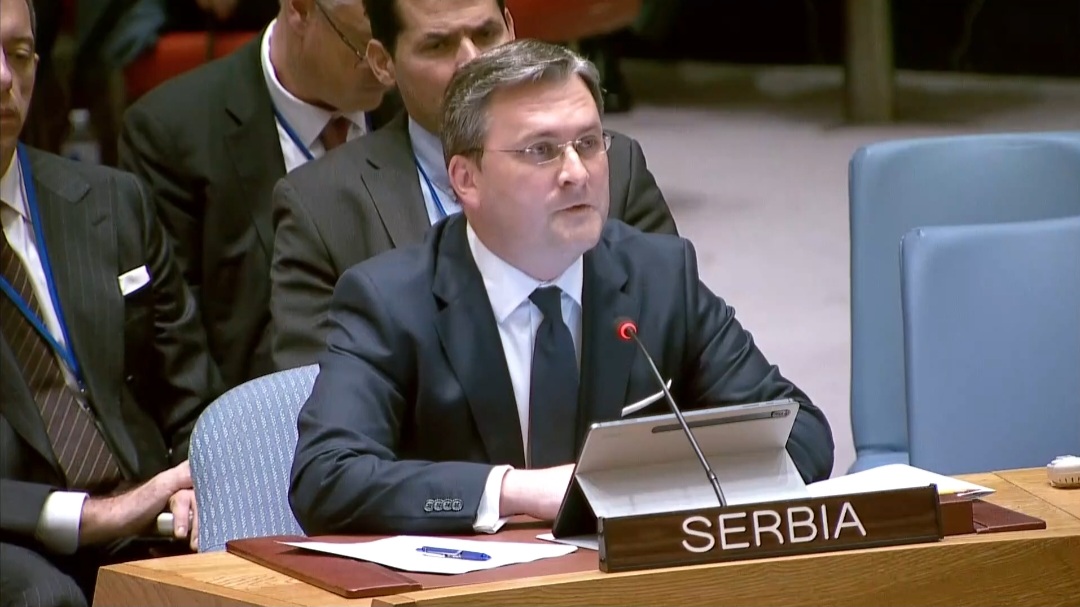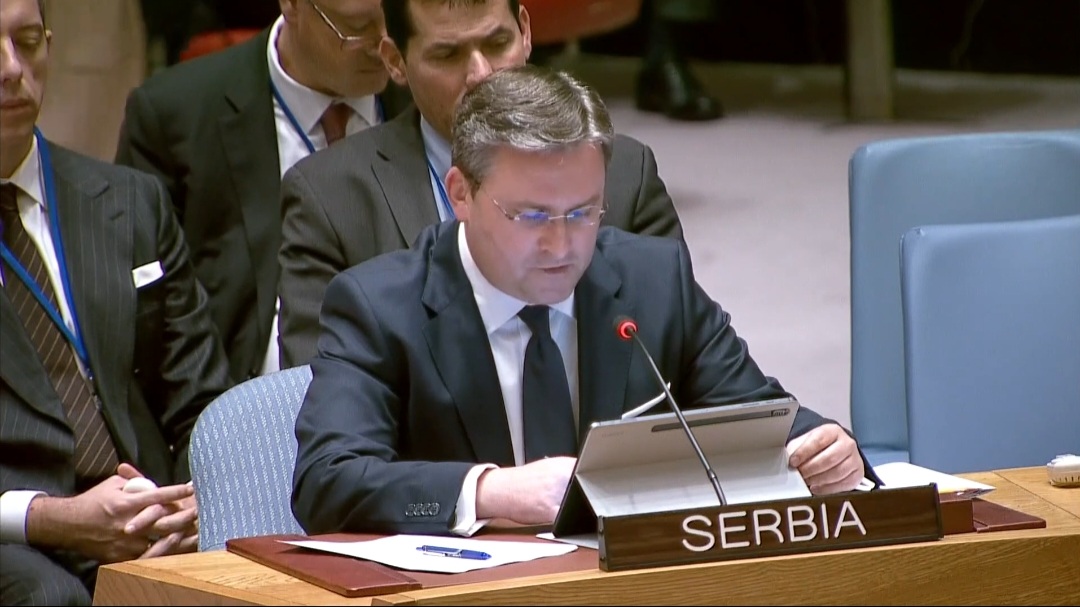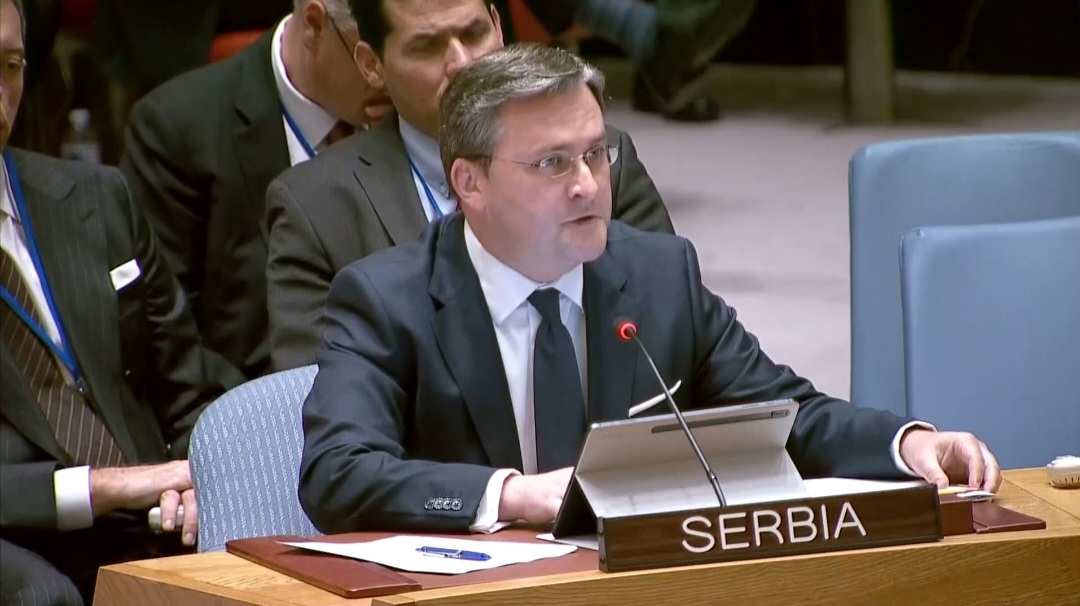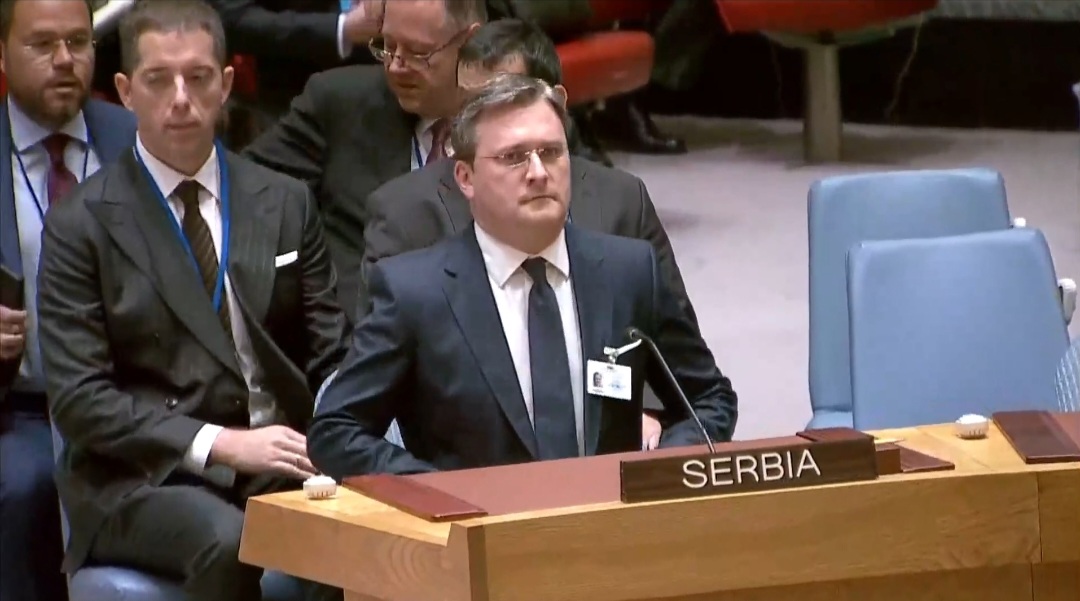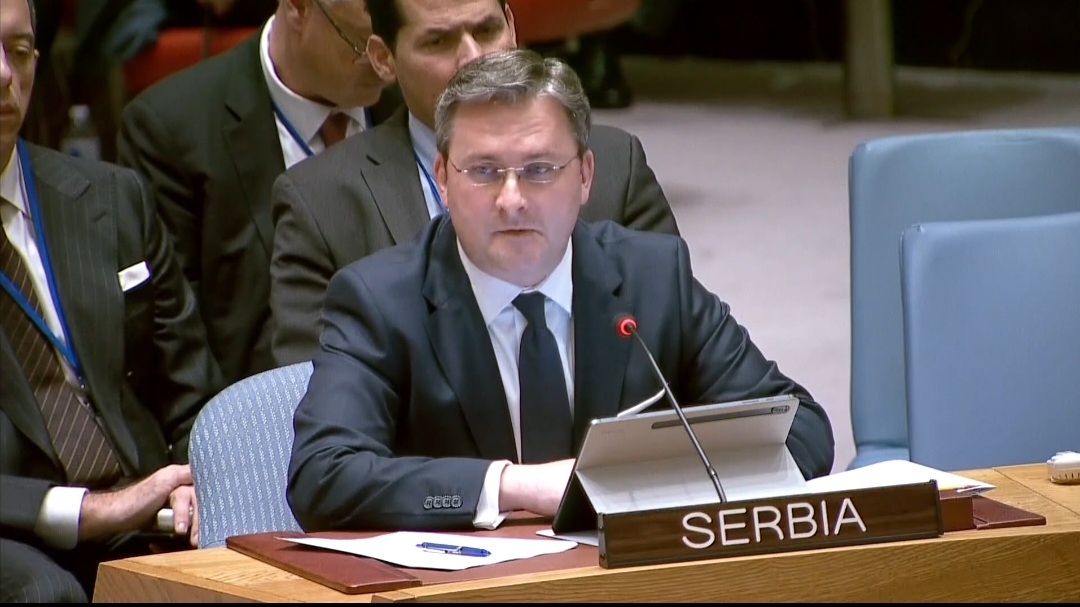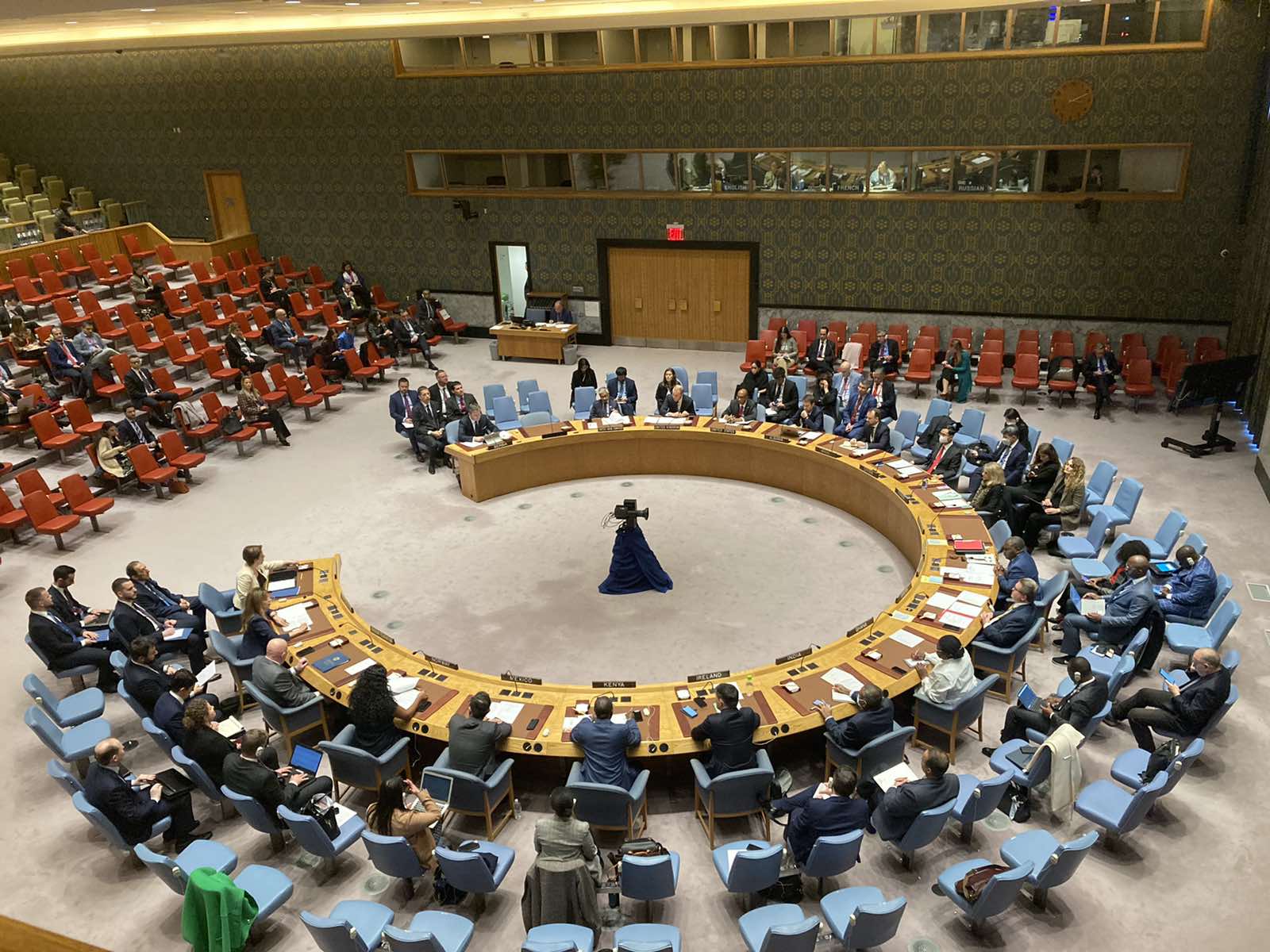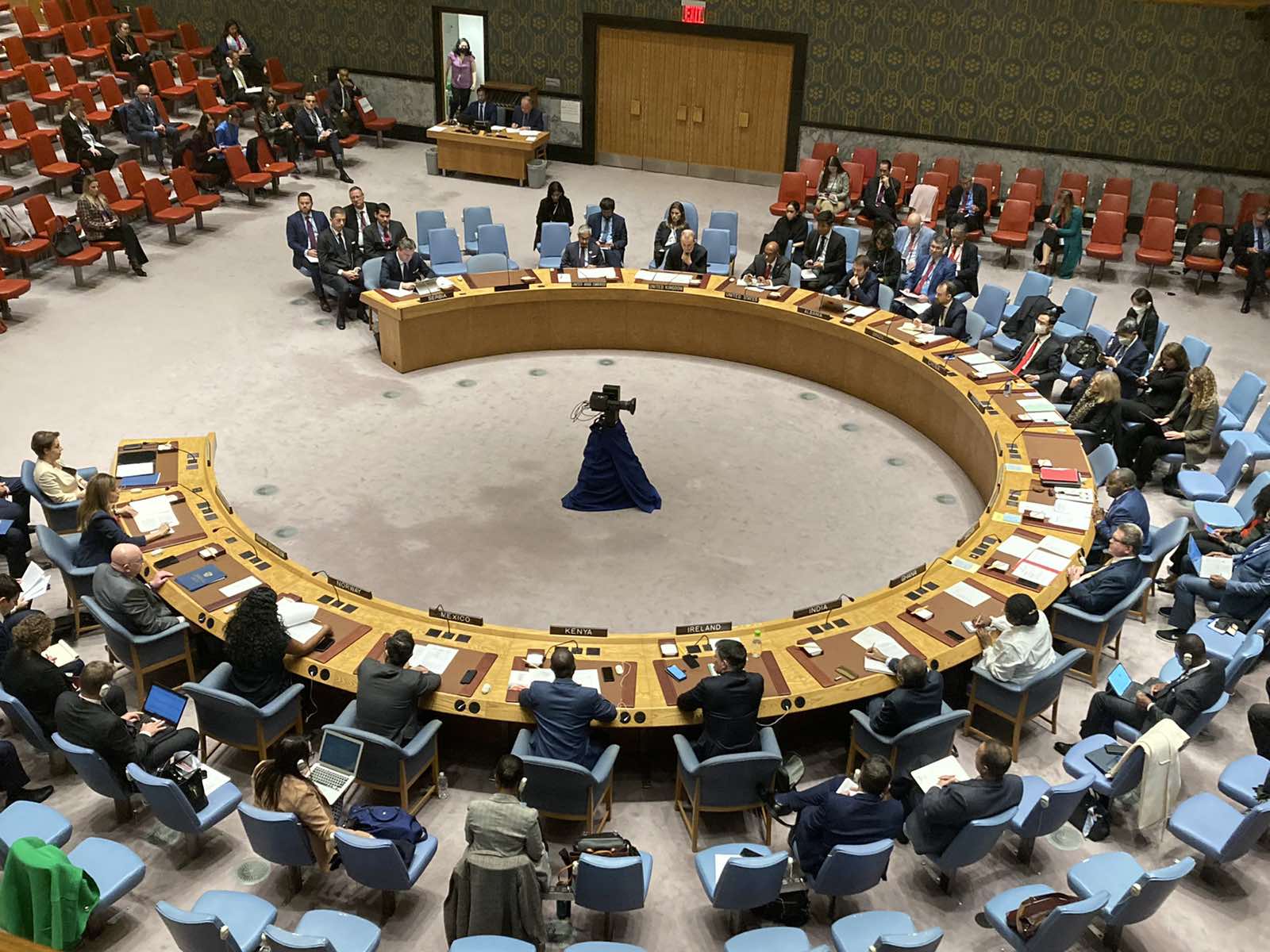Selakovic in the UN Security Council: Essential unwillingness of Pristina to find any compromise solution
In his address at the United Nations Security Council meeting on the occasion of the latest six-month report of the UN Secretary General on the work of UNMIK, Selakovic stated that the situation in our southern province was not exactly as presented in this document.
“With their irresponsible conduct, the provisional institutions of self-government are consciously sabotaging the efforts not only of Belgrade but also of the EU and other involved parties of the international community, with the clear intention of achieving two goals - the first being to avoid the implementation of assumed commitments. The second, the ultimate and far more alarming goal is the intimidation, marginalization and persecution of Serbs”, Selakovic warned.
According to him, Pristina was actively working on setting up administrative and bureaucratic obstacles, by taking steps and measures that were not agreed upon in the dialogue, it being the basic mechanism for reaching solutions.
He warned that Serbs were still, as in previous years, intimidated in different ways, encouraged to leave their homes, villages and cities where they were born and live in, and that those displaced were discouraged from returning to where they were born and started their lives.
“The provisional institutions work systematically to remove and erase as much as possible of the cultural and national diversity that still survives. At the same time, Pristina is consciously fueling inter-ethnic tensions using all available methods”, Selakovic said, citing the example of the arrest and conviction of Nikola Nedeljkovic for allegedly "inciting ethnic hatred and intolerance", but who was actually attending the St. Vitus Day (Vidovdan) celebration.
“I consider it necessary to emphasize that the true political will of the involved international actors and Pristina is necessary in order to create the conditions for the beginning of the end of discrimination on a national basis and common life in the Province”, Selakovic stated.
Addressing the course of dialogue between Belgrade and Pristina, Selakovic warned of the fact that Pristina applied the so-called policy of reciprocity, which by continuously insisting on mutual recognition as a central part of the dialogue, actually demonstrated the essential unwillingness of the current political leadership of Pristina to find any compromise solution.
“We assess as inadmissible attempts to disregard the current format of the dialogue, and cancel the agreements only because they are not to the liking of the current political factors. It is unacceptable that the current geopolitical circumstances are used to simply erase with one stroke what has been painstakingly worked on for years. Belgrade, I underline, was institutionally involved in the dialogue from the very beginning, while the commitment of the other side has varied and continues to vary depending on the political leadership that is in power”, Selakovic said.
The Serbian Foreign Minister warned that the harsher political rhetoric and narrative of the current leadership of the provisional institutions of self-government in Pristina are accompanied by concrete destabilizing steps, such as the measures on license plates.
As he explained, Serbia cannot in any way contain the revolt present among the non-Albanian population of Kosovo and Metohija as the citizens' protests represent a rebellion against many years of institutional violence and the deprivation of rights.
Despite everything, according to his words, Belgrade was consistently committed to a policy of peace, reconciliation, and regional cooperation pursued by the Serbian leadership, which was guided by the vision of building a common and prosperous future of the Balkans.
“I believe that it is incumbent upon today's leaders to create a clear common vision for the future generations. Such a vision was shown by the leaders of both Belgrade and Tirana by creating Open Balkan, an initiative from the region for the region, which is already producing concrete results. Serbia has on several occasions reached out to Pristina inviting it to join this initiative, in belief that there will be an awareness of the importance of economic connectivity and progress for the benefit of the citizens of the entire Balkans, only to be met with no understating from the other side”, Selakovic said.
He categorically rejected Pristina's argumentation regarding the alleged unconstitutionality of the formation of the Community of Serb Municipalities, because it was clear that Pristina's attitude towards this obligation reflected its attitude towards the Serbian people in the Province and indicated that it was against Serbian people being organized as an ethnic community and thus exercising their collective rights.
“I will remind you that the representatives of Pristina, although they often repeat in their statements that the case of the so-called Kosovo is a fait accompli, continue not to be recognized by the majority of UN member states for 14 years now. If the so-called Kosovo's independence is a reality, how come that we have the dialogue? And how come that Belgrade is faced with increasing pressures as regards the need for mutual recognition? What the current political leadership of Pristina refuses to accept is that Belgrade cannot be left out in the search for a final solution”, Selakovic explained.
Minister Selakovic expressed the expectation that UNMIK would continue to operate in an unchanged and undiminished scope and capacity, especially bearing in mind that the Mission had not yet achieved the main goal of its mandate - a peaceful and normal life for all citizens of our southern Province.
In conclusion, Minister Selakovic emphasized that Serbia had always been and remained deeply committed to finding a sustainable solution by peaceful means, for the sake of peace, stability and a common future.
Selakovic: A series of brutal lies told by Donika Gërvalla-Schwarz
The Minister of Foreign Affairs of Serbia Nikola Selakovic stated this evening in the United Nations Security Council that a minister of provisional institutions of self-government in Pristina, Donika Gërvalla-Schwarz, told a series of lies about the situation in Kosovo and Metohija, and denied her claims providing irrefutable arguments.
To the claim that the self-proclaimed "Kosovo" was the youngest democracy in Europe, Minister Selakovic answered by asking if anyone had heard of such a democracy in which voting at elections was prohibited to people, adding that voting was prohibited to Serbs living in Kosovo and Metohija twice this year.
Selakovic also described as a most brutal lie the claim that 90 percent of Serbian vehicles in Kosovo and Metohija were re-registered with RKS license plates, because out of more than 9,000 vehicles in the north of the province, only two were re-registered.
“We could hear from Madam Schwarz that she is obsessed with President of Serbia Aleksandar Vucic, as she mentioned his name nine times saying that he was preparing an aggression, but she did not say what Pristina is doing. We have been hearing those lies for more than eight months, that Belgrade is preparing an aggression, that Serbia is behaving like someone’s proxy, while at the same time Pristina and Albin Kurti are building four special police bases in the north of Kosovo and Metohija. What is the reason for that, if not a preparation for aggression and expulsion of Serbs from Kosovo and Metohija”, Selakovic said.
Minister Selakovic responded to claims that Serbia was promoting a Nazi ideology by reminding that Pristina had prepared a project to renovate the house of Xhafer Deva, a well-known Nazi collaborator, who was decorated by Adolf Hitler himself.
The Head of Serbian diplomacy quoted parts from an interview with Albin Kurti, from February this year, in which he promotes the unification of the self-proclaimed "Kosovo" and Albania, and reminded that such a project existed only in World War II as a Nazi proxy state.
“Do not be obsessed with President Vucic, maybe the best for you is to submit the application to become one of his pupils. He can teach you a lot about politics, diplomacy, about the international law which includes Resolution 1244 as well, which defines Kosovo and Metohija as a part of Serbia", Selakovic said.
Responding to Gërvalla-Schwarz's claims about crimes against Albanians, Selakovic asked where the former president of the so-called "Kosovo" Hashim Thaci was today.
“What are Hashim Thaci and Kadri Veseli doing in the detention unit in The Hague? They are certainly there to play cards or Risk. They are there to be tried and I believe sentenced for the horrible crimes they committed against Serbs and other non-Albanians in Kosovo and Metohija”, Selakovic said.
Regarding the allegation that Belgrade was breaching the agreements reached in Brussels, Selakovic reminded that Pristina had refused to form the Community of Serb Municipalities for 3,470 days, while loudly saying they are not going to do that.
“One famous poet said: when you are lying, lie in a way that people can trust you. Next time, you should take some other angle if you really want to make some effect”, Minister Selakovic said.

